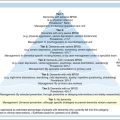Chapter 11 THE THERAPEUTIC RELATIONSHIP
INTRODUCTION
The therapeutic relationship differs from ordinary human relationships in that its purpose is to allow the diagnosis and treatment of a health problem. It is usually assumed that both parties to the therapeutic relationship—the older person, and the health worker or health team—consent to the relationship and work constructively towards its development. However, there are particular challenges in mental healthcare generally and in caring for older people, particularly those with cognitive impairment, which can threaten the therapeutic relationship. This chapter deals with important concepts for the mental health worker attempting to optimise their therapeutic relationships with older people.
PERSON-CENTRED CARE
Person-centred care refers to the philosophy of caring for people as individuals, rather than as sets of problems or diagnoses. In order to deliver person-centred care, it is necessary to know quite a lot about the person for whom the care is being provided. Detailed information about the personal and developmental history of the older person is essential to this process. Once trust has developed between the mental health worker and the older person, this information should generally be straightforward to obtain. However, the mental health worker does need to maintain a sense of curiosity about the older person and be alert to opportunities to learn more about their broader life and experience. A person-centred approach is important also for people with dementia (Kitwood 1997). In this situation, considerably more effort may need to be made to track down collateral sources of information about the persons early life, their usual interests, and their likes and dislikes. However, this investment of time will often pay dividends in terms of the health worker’s ability to understand the older persons behaviour in the context of their past life and usual habits.
Mental health workers often obtain a detailed account of the older person’s current symptoms and past history of mental health problems when undertaking their initial assessment. However, when working under time pressure with very ill people, it is easy to neglect to seek a comprehensive personal and developmental history from each person. Nevertheless, it often turns out to be a false economy in the longer term not to have obtained this vital information early on in the therapeutic relationship. In older people, there is obviously quite a lot of personal history to obtain and it usually helps to use a template or structure to organise this information. Key headings will often include family relationships, history of childhood neglect or abuse, schooling, history of traumatic experiences, religious observance, military service, relationship history, occupational history, travel history, sport, hobbies, voluntary work and club memberships. Chapter 12 describes psychiatric history in more detail.
For some people and in some cultures, care is more appropriately delivered in partnership with the family or cultural group, rather than with the individual. Thus, in certain circumstances, it may not be appropriate to adopt a strict person-centred approach because group values and group processes are the cultural norm. Considerable judgment may be needed in order to decide whether to interview the person alone or with members of their family or cultural group. If in doubt, it is often worth doing both, thus allowing the person the opportunity to express their views without the influence of their supporters. Cultural issues are discussed in greater detail in Chapter 6.
THE SICK ROLE
The sick role is a sociological concept first described by Talcott Parsons in 1951 (Parsons 1951). It refers to sanctioned social deviance in which the sick person is exempt from normal social roles and is considered not responsible for their condition. In return, the sick person should try to get well by seeking technically competent help and by cooperating with health workers. As a concept, the sick role only works if the person has insight into their illness and the health worker accepts the person as being ill (Mechanic 1995). Problems arise with the sick role if the person denies that they have an illness or if the health worker does not accept that the person has an illness. Against this background have arisen the concepts of ‘abnormal illness behaviour’ (Pilowsky 1969, 1993, 1997) and ‘abnormal treatment behaviour’ (Singh et al 1981).
THERAPEUTIC ALLIANCE
The therapeutic alliance refers to the cooperative relationship between a mental health worker and the older person that is intended to improve the outcome for the person. A strong therapeutic alliance is associated with improved adherence to prescribed treatments, including psychotherapy and medication. It is also associated with improved outcomes for older people. A satisfactory clinician–patient relationship might itself have therapeutic effects (Priebe & McCabe 2008). The therapeutic alliance is a form of attachment behaviour and is more likely to develop if the mental health worker takes a warm and open approach towards the older person. Good eye contact, genuineness, active listening and summarising, and demonstrating respect for the person, are all likely to assist with the development of a therapeutic alliance.
Stay updated, free articles. Join our Telegram channel

Full access? Get Clinical Tree





